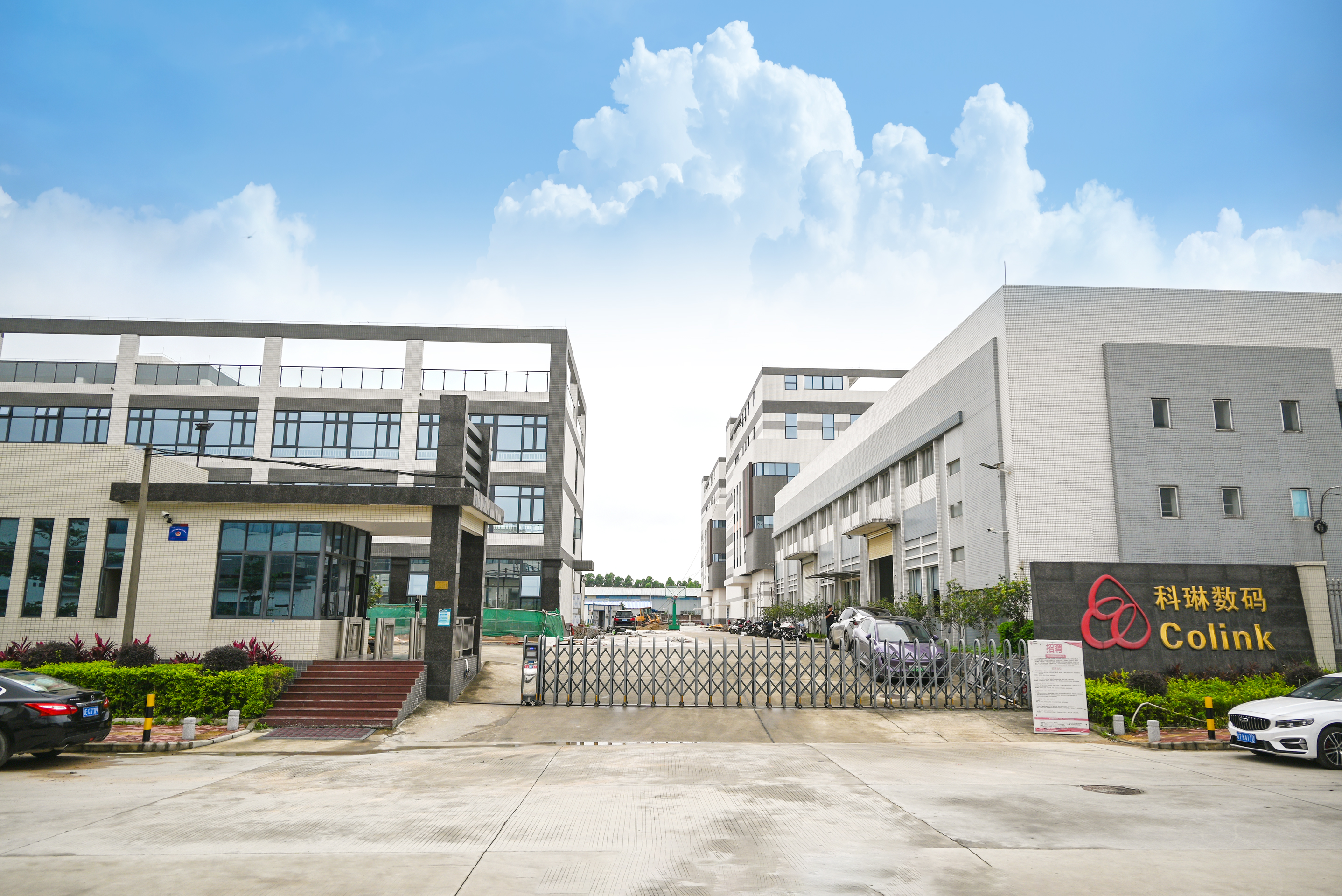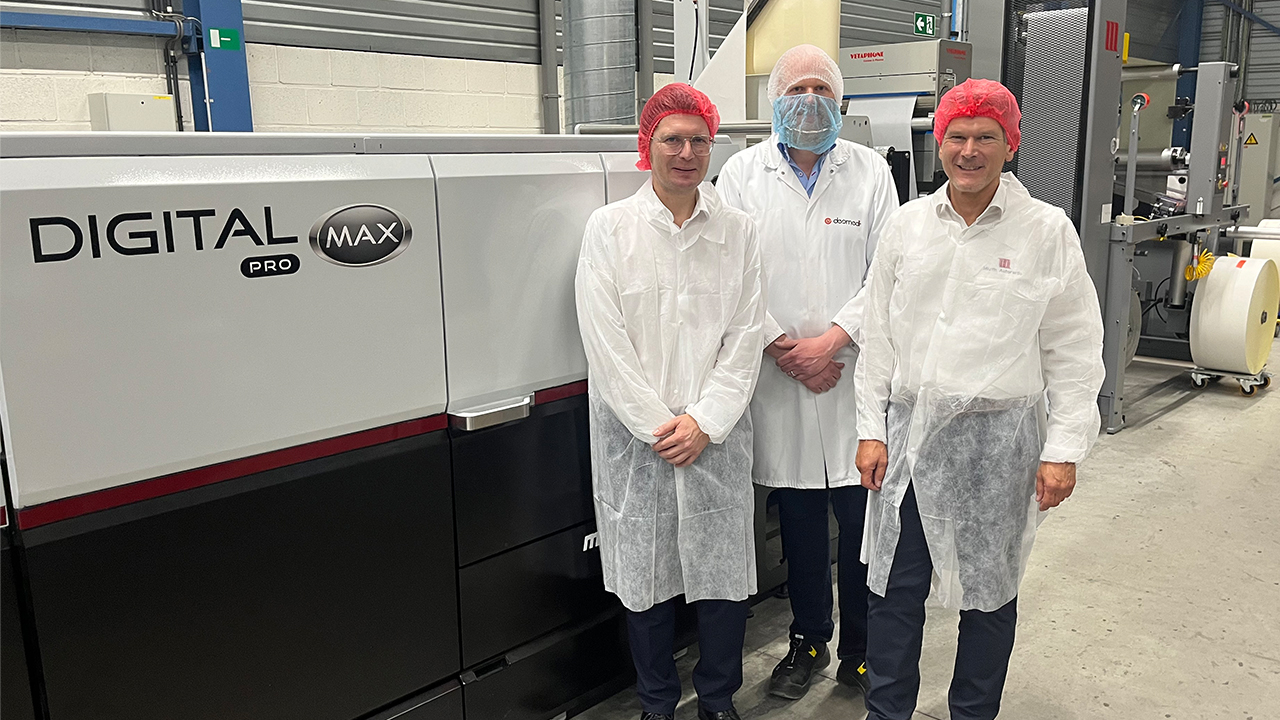Colink installs first Domino N730i in China
Leading anti-counterfeit specialist Colink has added to its digital capabilities with its first UV inkjet press from Domino.

In the dynamic landscape of anti-counterfeit label printing, Chinese converter Colink has always stood at the forefront. Now, with an investment in China’s first Domino N730i digital label press, Colink is poised to redefine the anti-counterfeit sector. Let’s explore the secret of Colink’s success in the anti-counterfeit label market over the past 23 years.
Established in 2019, Colink Guangdong is a wholly owned subsidiary of Colink Guangzhou, located in Heshan City, Guangdong Province, with a production plant covering 60,000sqm and employing over 300 staff. The company specializes in variable information labels, RFID tags and flexible packaging, offering end-to-end solutions from design to production of anti-counterfeiting, traceability and personalized packaging.
Company founder Lan Qiang’s journey began in 1999, fresh out of South China University of Technology. After three years in the print industry, he spotted considerable potential in anti-counterfeit labels and founded Colink Guangzhou in 2002. Starting with label printing, and barcode printer sales and maintenance services, the company hit its stride in 2008 when it became a top supplier of CITC electronic identification codes, which opened up broader markets and new clients in the label printing industry.
We’ll accelerate equipment upgrades to enhance smart manufacturing capabilities, implement phased capacity expansion to meet rising demand, and ramp up R&D
Building on this success, in 2009, the company expanded into the anti-counterfeit label market, enhancing its technical prowess and competitiveness in this complex fi eld and establishing a strong reputation in the brand protection industry.
Tech-driven growth
For anti-counterfeit label converters, technology is the name of the game. Colink has built a top-notch R&D team that has dug deep into the anti-counterfeit label space, fi ling multiple patents along the way.
When it comes to production, the company was an early adopter of digital printing, becoming the first converter in South China to use multiple HP Indigo machines, which helped lock in its lead in the digital printing arena.
After years of honing its business in anti-counterfeit labels, Colink has racked up rich production experience and a loyal customer base.
As business boomed, 2019 saw the company set up a wholly owned subsidiary in Heshan, Colink Guangzhou, to further focus on anti-counterfeit label printing, while ramping up investments in equipment and R&D.
Lan Qiang, with his keen insight into industry trends, remarks: ‘Modern anti-counterfeit labels have evolved from single-functional anti-counterfeit tools into multi-functional “information carriers”. Variable data codes are the core of this evolution, and digital printing serves as the pivotal enabler for this core functionality.’
Digital print technology and anti-counterfeit are therefore inherently complementary, driving each other’s growth. As market demand for anti-counterfeiting continues to escalate, digital printing will play an increasingly vital role in the anti-counterfeit label sector, while the growth of the anti-counterfeit label market will, in turn, spur innovation and advancement in digital printing technology.
To address the diverse market demands, Colink has achieved seamless integration of digital printing with traditional processes, such as flexo and offset, supplemented by dedicated anti-counterfeit technologies, including laser and optical solutions.

This technological versatility enables the company to handle both high-precision customized printing and large-scale industrial production.
Simultaneously, the company has kept pace with market trends by expanding into RFID tags and digital flexible packaging, building a highly diversified product portfolio. Its market reach spans food, cosmetics, apparel, electronics, tobacco and alcohol industries.
Domino investment
At a pivotal stage in the evolution of digital printing technology, Colink made a strategic leap by becoming the first converter in China to install the Domino N730i label digital press, positioning itself to capitalize on what Qiang calls the emerging ‘embossed’ UV digital printing sector, a burgeoning market frontier. When discussing this investment, Qiang radiates both resolve and enthusiasm.
He explains that digital printing can be categorized into ‘flat’ and ‘embossed’ based on the printing performance. ‘Flat’ digital printing has matured and scaled now, and Colink has achieved significant success in this domain. Meanwhile, ‘embossed’ UV digital printing technology is developing fast, particularly with the rise of domestic UV digital presses, signaling an imminent surge in market scale. Any delay in investing in this area could mean missing out on a pivotal growth opportunity, he believes.
‘UV digital printing technology has reached an inflection point where the decision for enterprises is no longer about whether to invest, but rather which supplier or brand to select,’ he emphasizes. ‘The market momentum has already been established; the segment is rapidly maturing.’
Qiang points out that escalating industry competition has made printing companies more cautious about investing in new equipment.
However, he insists that true cost savings lie not in skimping on equipment investment, but in reducing subsequent production costs. Colink’s investment in the Domino N730i followed a rigorous comparison and assurance process.
‘Domino is a trusted name in the digital label printing market, and we were interested in assessing the capabilities of the N730i and whether it would suit our needs,’ said Qiang. ‘Its high quality and resolution (1,200 DPI), speed (70m/min), and ultra-stable production capacity will significantly lower our operational costs and boost production efficiency.’
UV digital printing technology has reached an inflection point where the decision for enterprises is no longer about whether to invest, but rather which supplier or brand to select
Recalling a pivotal visit to a Domino customer in South Korea, Qiang says: ‘During a two-hour observation of the N730i printing shampoo labels, the machine operated continuously without any malfunctions or maintenance requirements besides routine material changes. This exceptional stability fundamentally altered my perception of UV digital printing technology, prompting an immediate decision to choose it.’
He adds: ‘UV inkjet printing is different from HP Indigo digital printing technology. Our investment in this new equipment is not aimed at replacing our existing production systems but using this new digital printing technology to explore new applications, serve new markets and sectors, and achieve strategic business expansion.
‘We intend to leverage the N730i to access new customer segments, harnessing our differentiated technological edge to forge a new growth trajectory,’ Qiang elaborates. ‘The N730i will not only drive down production costs and elevate operational efficiency but also allow us to differentiate our offering into premium labels and meet evolving market needs.’
He dispelled any doubts about Domino’s ongoing maintenance and after-sales service after contacting their local agent, Beijing Jetrun Technology.
Yajuan Liu, general manager of Beijing Jetrun Technology, adds: ‘The Chinese label printing market is facing unprecedented changes and challenges, and the Domino N730i press holds many advantages for forward-thinking converters like Colink.’
Liu provided coding services for the Colink company for many years before she became the distributor of Domino equipment.
The future
Looking back on 2024, Qiang’s eyes sparkle with pride as he reflects: ‘Colink achieved double-digit growth last year, maintaining a steady upward trajectory amid industry fluctuations.’
This consistent performance, he emphasized, stems from the company’s relentless pursuit of technological innovation and uncompromising commitment to quality standards. This dual pillar has become the cornerstone of its resilience.
Like any growing enterprise, Colink has navigated a landscape of intensifying market competition while capitalizing on emerging opportunities. The next big move on the horizon is the upcoming launch of its new production facility, which will not only alleviate capacity constraints but also create a state-of-the-art manufacturing ecosystem to support diversified business expansion.
Outlining his strategic vision for the year ahead, Qiang articulates a clear roadmap: ‘We’ll accelerate equipment upgrades to enhance smart manufacturing capabilities, implement phased capacity expansion to meet rising demand, and ramp up R&D investment to fast-track the commercialization of our pipeline products. This three-pronged approach will strengthen our market responsiveness and solidify our technical leadership.’
Looking forward, Colink will remain driven by technological innovation, deepening its expertise in the anti-counterfeit label sector to deliver new products and services. Lan Qiang also issues an appeal to industry peers: ‘In today’s fiercely competitive environment, only by adhering to innovation and selecting suitable equipment can we drive the industry forward.’
From a small workshop to an industry benchmark, Colink is stepping firmly toward a bright future in the anti-counterfeit label industry.
Sidel’s Beijing plant advances rooftop solar system
Sidel’s Beijing plant has achieved full grid connection for its rooftop solar photovoltaic system, marking a significant step forward in the company’s decarbonization.
With an installed capacity of 2.1 MW, Sidel Beijing’s solar system is expected to generate 4,394,700 kWh annually, meeting 60 percent of the plant’s daily operational electricity needs and reducing CO2 emissions by 2,452 tons per year.
Through its ‘self-consumption with surplus feed-in’ model, 35 percent of the clean energy generated will be fed back into the municipal grid via smart power networks after fulfilling on-site demand. This enables optimized allocation and efficient utilization of green energy.
As a signature project to China’s ‘Dual Carbon’ strategy implementation, the installation features industry-leading LONGi Hi-MO7 high-efficiency modules with 615W panel power and a top-tier conversion efficiency of 23.1 percent.
Since establishing operations in Beijing in 2008, Sidel’s Beijing plant has embedded sustainability into its core strategy. Continuous environmental investments and innovations culminated in 2025 certifications, including ISO 50001:2018 Energy Management System, ISO 14064-1:2018 Zero Carbon Factory and GB/T 39257-2020 / GB/T 33635-2017 5-Star Green Supply Chain Management.
As a Beijing-certified Green Factory, Sidel’s environmental efforts go beyond solar energy, encompassing an intelligent Energy Management System and Building Automation System for precise energy control, a retrofit program for equipment frequency conversion to reduce consumption, low temperature distillation technology to minimize effluent from acid-wash passivation and more.
Stay up to date
Subscribe to the free Label News newsletter and receive the latest content every week. We'll never share your email address.


